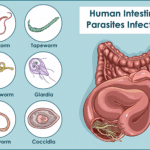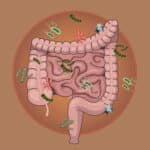New Treatment for Methane SIBO (IBS-C) in Phase 2 Clinical Trials
A phase 2 clinical trial on humans is currently in progress that sounds promising; evaluating the effect of lovastatin lactone on methanogens and symptoms in patients with irritable bowel syndrome with constipation.
If you recognized the word ‘statin’ in lovastatin, yes, you are correct. This is a statin drug!
Statins can inhibit archaeal cell membrane biosynthesis without affecting bacterial numbers as demonstrated in livestock and humans. This opens the possibility of a therapeutic intervention that targets a specific aetiological factor of constipation while protecting the intestinal microbiome. While it is generally believed that statins inhibit methane production via their effect on cell membrane biosynthesis, mediated by inhibition of the HMG-CoA reductase, there is accumulating evidence for an alternative or additional mechanism of action where statins inhibit methanogenesis directly. It appears that this other mechanism may predominate when the lactone form of statins, particularly lovastatin lactone, is administered.

The study is being done by Synthetic Biologics, Inc., who describes themselves as a “clinical-stage company focused on developing therapeutics to protect the microbiome while targeting pathogen-specific diseases.”
"Is Lovastatin the Answer for IBS C SIBO Methane Sufferers at SIBO Guru"
↑ Tweet ThisThey announced the study and preliminary findings at the American College of Gastroenterology (ACG) Annual Meeting in Honolulu, HI. The research was sponsored by Synthetic Biologics and performed at Cedars-Sinai under the direction of Mark Pimentel, M.D., FRCP(C), Director of Cedars-Sinai Medical Center’s (CSMC) GI Motility Program and Laboratory, and Chairman of Synthetic Biologics’ IBS-C Clinical Advisory Board.
“The presentation at the ACG Annual Meeting highlighted the therapeutic potential of SYN-010 (lovastatin) for IBS-C,” stated Jeffrey Riley, Chief Executive Officer for Synthetic Biologics. “As we continue to move our IBS-C program through two ongoing Phase 2 clinical trials, this research, along with SYN-010’s novel modified-release formulation of the widely prescribed lovastatin lactone, provides a strong body of support for SYN-010’s efficacy in reducing methane levels in the gut. We continue to expect topline results from the first Phase 2 clinical trial of SYN-010 during the fourth quarter of 2015, and topline results from the second Phase 2 clinical trial during the first half of 2016.”
Synthetic Biologics’ proprietary SYN-010 is a modified-release formulation of the lactone form of lovastatin that is intended to reduce methane production by certain microorganisms (M. smithii) in the gut while minimizing disruption to the microbiome. Methane produced by M. smithii is perceived as the underlying cause of pain, bloating, and constipation associated with IBS-C, and published reports have associated higher intestinal methane production with increased constipation severity in IBS-C patients. SYN-010 is intended to act primarily in the intestinal lumen while avoiding systemic absorption, thereby targeting the major cause of IBS-C, not just the symptoms.
The CSMC poster, entitled “Lovastatin Lactone Inhibits Methane Production in Human Stool Homogenates,” included data from studies comparing the effects of different statins and statin forms (lactone vs. beta-hydroxyacid) on methane production by stool homogenates from five female donors with high levels of breath methane. Dr. Pimentel concluded that, of the various statins examined, lovastatin lactone was the only effective inhibitor of methane production in the stool homogenates, significantly inhibiting methane levels by -65% compared to the control stool.
“This lovastatin data suggests that SYN-010 has therapeutic potential to diminish the production of methane in the gut, thereby treating the cause of IBS-C, not just the symptoms,” said Dr. Mark Pimentel.
I am encouraged at the prospect of a front line treatment to knocking down methane producers! This, coupled with the right herbal antimicrobial protocol and then gut healing and rebalancing may finally offer some long term relief for chronic constipation sufferers with stubborn methanogen levels! I am looking forward to seeing the Phase 2 trial results and I hope that they track these patients out over six months, a year and beyond. We need to continue to look for LONG TERM results for reducing methane producer.
Angela Pifer | Functional Medicine Nutritionist
SIBO Guru
Enjoying this content? Sign up for updates... It's FREE!


















Comments
from 19 people
Hi Jamie! I'll be at DDW this month- Digestive Disease Week in San Diego - there will be new announcements made and I'll be sure to share them with you!
Angela Pifer
Hello. Are there any updates to the information in this article?
Jamie
I am so sorry to hear about your situation Terri. I do not recommend rifaxamin without a breath test, diagnosis and a clear plan for treatment. If your doctor recommended removing your gall bladder to attempt to resolve symptoms (without a clear reason for removing your gall bladder) then I would immediately find another doctor.
Angela Pifer
after many tests and scans results show gall stones. I have been unable to work due to horrible gas pain, bloating and discomfort not to mention I live in my bathroom and on and off toilet all day long. She recommends gallbladder removal as solution but said may or may not ease my symptoms. She prescribed riflaxamin without doing any breath tests or stool samples for testing. I am concerned about taking antibiotic with no diagnosis if I even have Sibo. Also concerned about taking antiobiotic for 2 weeks prior to a major surgery. I don't know what to do please help me. Thank you.
terri
Hi Pesho,
For SIBO to be present, there is a breakdown of motility in the small intestine, often an issue with the ileocecal valve allowing organisms to migrate from the large intestine into the small intestine and the effects to deal with, that are caused by SIBO being present (inflammation, malnutrition... etc). When we treat SIBO, we are not "killing the bugs." We have to address the underlying condition, treat SIBO without causing more harm in the gut, recover the integrity of the gut, rebalance the flora, etc. This takes time. The gut is a diverse ecosystem. A low carb eating plan doesn't treat SIBO. It will only reduce the symptoms that someone is having because of SIBO.
2-3 weeks of eating butter and cream (which both contain lactose) - might make someone worse. SIBO organisms affects the microvilli and reduce the presence of brush border enzymes, like lactase, fructase, and DAO enzymes. They also uncouple bile, so people have a harder time digesting fats. Your diet will also nutritionally deplete someone, who is also likely nutritionally depleted (again, due to SIBO and effects).
The gut is a very complicated place. We cannot drano it and more than we can spray round up on the rain forest and think that we have fixed a weed problem.
Warmly
Angela
Angela Pifer
Angela please tell me what is the problem with sibo - why sites like your state that it needs months to cure - if someone eat very low carb or low carb diet what will feed the bacteria in small intestine - they will day after several days? If you eat cheeses, cream, butter, meats ,eggs for 2 -3 weeks - why would not cure sibo?
pesho
This is promising. I hate pharmaceuticals but it may be worth it
kb
This is wonderful news! Thank you, Angela, for keeping us in the loop!
Kim T.